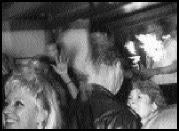RICH LANG, pastor of Ballard’s Trinity United Methodist Church, is used to getting heat from his neighbors for running programs for the homeless out of his tiny church. But Lang never expected the storm of protest that was unleashed when he announced earlier this month that Trinity would, starting in late March, be host to Tent City, the nomadic homeless encampment run by SHARE/WHEEL.
“There’s a cluster of people in the neighborhood who are militantly opposed to Tent City,” Lang says. “One neighbor threatened to shoot me with a shotgun, one threatened to sue me personally, and one was out writing down license plates of people who attended the church.” Since the announcement, neighbors have also filed a complaint with the city, alleging “tent encampments are not a permitted use in any zone of the city.”
Trinity wasn’t always the epicenter for neighborhood conflict that it is today. For years, the church was in what Lang calls a crisis, shrinking every year in attendance and visibility. Trinity made its reputation as a political hot spot when it first hosted Tent City in the spring of 2001, prompting a complaint to the city that nearly sparked a courtroom war between the church and several of its neighbors, who argued that the tents constituted illegal substandard housing. Although the neighbors lost their battle when then-Mayor Paul Schell agreed that the congregation had a right to host the encampment, the acrimony never cooled into an armistice, and as soon as Tent City came back, so did the complaints. If this latest complaint goes to court, the church will argue that, as a religious institution, it has the right to minister to the homeless as it sees fit; under federal law, churches are exempt from many local land-use rules.
Lang and SHARE/WHEEL representatives hope it won’t come to that. Lang says he wishes the neighbors who oppose Tent City would spend their anger and energy fighting “the problem of homelessness and why this is happening in a city that is so affluent.”
Erica C. Barnett







